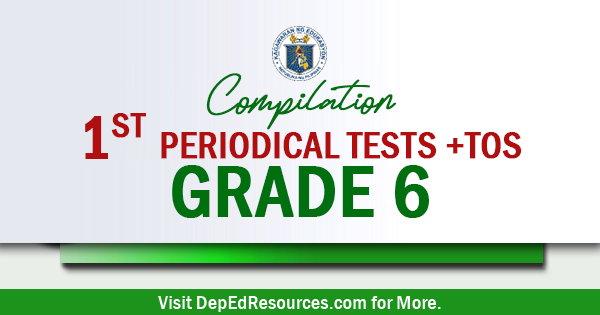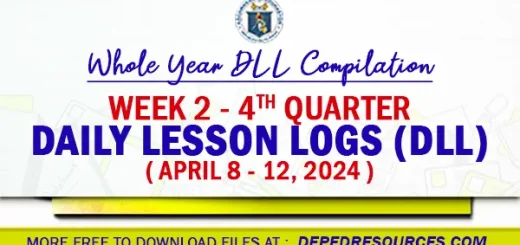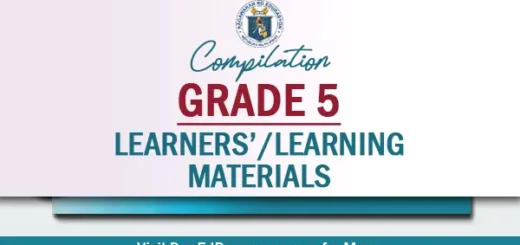GRADE 6 – 1st Periodical Tests – All Subjects with TOS
Good day teachers! We hope these help in the upcoming periodical tests! We are constantly uploading GRADE 6 – 1st Periodical Tests – All Subjects with TOS. You will find the Google download links below.
Education System Performance and System Evaluation
The development of system performance indicators and metrics that provide a thorough comprehension of how well education is being delivered is a top priority within the evaluation and assessment framework. Governments can analyze performance using this data to determine the most important areas for planning, intervention, and policy. Usually, this involves creating a framework for measuring system performance.
The focus is often on outlining the viability of metrics in each area after outlining top level educational system objectives. Other phases involve making sure that agreed-upon definitions of the already-existing information at various levels of the system are collected methodically, encouraging data quality improvement, conducting research to identify some of the “gaps” where systematic collection is too expensive or impractical, and creating a long-term plan to enhance measurement tools for long term information requirements.
Numerous quantitative and qualitative metrics should be used to influence legislation. It can be difficult to make sure that system performance metrics are comprehensive enough to account for all possible student learning goals. High quality data and evidence must guide policy decisions at the system level; nevertheless, the availability of such data must not be the primary factor.
Key indications are provided by student assessment for evaluating system performance. At the national and local levels, decision makers, the general public, administrators, teachers, and parents can use evidence from student learning assessments to judge how well students are currently performing in relation to their learning objectives and how well their improvement goals are being met.
There are various ways to measure system performance in accordance with national assessment programs. Regular sample-based student tests may assist minimize distortions brought on by “teaching to the test” and provide a wider range of measurement and curricular coverage. They are rather inexpensive to perform.
Full cohort student assessments, in comparison, offer the advantage of providing prospective input to schools on courses and students, but they are more limited measurements that cannot in all honesty cover the entire curriculum. Large-scale standardized exams are frequently constrained to written formats, such as multiple-choice or brief essay questions, because they are easiest to grade and most cost-effective to implement. As a result, these examinations might only assess a small subset of students’ abilities.
Full-cohort national assessments may also be performance-based, in which case pupils are graded on free-form performances including written essays, oral communication abilities, cognitive processes, cooperative problem solving, and so forth. These are sometimes regarded as more closely connected with curriculum that place an emphasis on the acquisition of higher-order thinking abilities and the ability to handle complicated tasks.
The difficulty lies in coming up with methods to gather data that are legitimate, trustworthy, and comprehensive enough to track performance over time against important national educational goals for various sub-national regions and student populations.

GRADE 6 – 1st Periodical Tests with TOS
- GRADE 6 1st Periodical Test in ARALING PANLIPUNAN
- GRADE 6 1st Periodical Test in ENGLISH
- GRADE 6 1st Periodical Test in EPP
- GRADE 6 1st Periodical Test in ESP
- GRADE 6 1st Periodical Test in FILIPINO
- GRADE 6 1st Periodical Test in MATHEMATICS
- GRADE 6 1st Periodical Test in PHYSICAL EDUCATION
- GRADE 6 1st Periodical Test in MUSIC
- GRADE 6 1st Periodical Test in SCIENCE
- GRADE 6 1st Periodical Test in TLE
- GRADE 6 1st Periodical Test in TLE-AGRI
ADDITIONAL VERSIONS
- GRADE 6 1st Periodical Test in ENGLISH Version 2
- GRADE 6 1st Periodical Test in ESP Version 2
- GRADE 6 1st Periodical Test in ESP Version 3
- GRADE 6 1st Periodical Test in FILIPINO Version 2
- GRADE 6 1st Periodical Test in MATHEMATICS Version 2
- GRADE 6 1st Periodical Test in MATHEMATICS Version 3
MORE TEACHERS FILES HERE
Please visit our website from time to time for new and unannounced additional uploads. Thank you.
You may also request for specific files in our Facebook Page.
Don’t forget to LIKE our Page!
Please LIKE and SHARE so everyone would benefit from these files. Thank you!
LIKE US on Facebook! Click Here.
“I cannot do all the good that the world needs. But the world needs all the good that I can do.”
―
 Learn about the information we collect and how it's used.
Learn about the information we collect and how it's used. Discover how we protect your data.
Discover how we protect your data. Understand your rights and choices regarding your personal information.
Understand your rights and choices regarding your personal information.















Very Helpful! Instant reviewer Thank you.
Thank you.
God bless